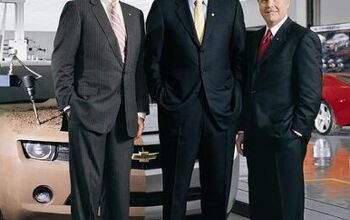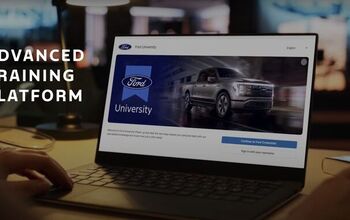Guest Editorial: Retooling GM's Culture, Part Four
[Editor’s Note: This is the last part of a four-part series by Dr. Rob Kleinbaum. Here are parts 1, 2, 3. A PDF version of the entire editorial is available, courtesy of Dr. Kleinbaum, here.]
Serious consideration needs to be given to a radically different organization that would give people overall business responsibility and accountability and increase their contact with markets and the external world. The current direction is to move away from integrated business responsibility by creating strong functions with weak business units, and the problem is compounded by making the transition slowly, so there is continual confusion and conflict over who is responsible for what. The company is doing this to “leverage its global strengths” but the real effect is to create an organization where fewer and fewer people are actually running a business or have contact with the outside world and control is becoming more and more concentrated in a few people.
Education and training need to be made part of everyone’s life, from the most junior to the most senior. This becomes even more important in times of stress, as it demonstrates long term commitment to people and, more importantly, to the future. A portion of this education should take place outside of GM to increase exposure to people outside the industry. In the scheme of things, the costs of education and training are truly negligible. If someone asks to calculate the ROI, it should be used as a litmus test for determining candidates for structural cost reductions.
GM’s decision making processes need serious revamping. Despite improvements, most meetings are still exercises in procrastination, rubber stamping or idea killing, without anything that would pass for genuine debate and dialogue. Dealing with complex issues requires genuine discussion, feedback, and intellectual engagement. Changing the people, along with the structure, should help enable this key cultural change but there must also be a conscious choice among the leadership that they want to make this transformation.
These modifications would also disrupt patronage relationships and should permit merit to become more important, especially if there is an influx of outsiders and overseas managers. Also, in the same way that having an African American become president of the United States will change many American’s notion of what it means to be an American and what can be accomplished, having someone who is genuinely “different” will help many people in the company see GM differently. If the competent people in Brazil see that there is a real chance they can reach the top, it will change their level of engagement and the company will be much better for it.
Implementing these changes piecemeal will not be enough to make meaningful changes in GM’s culture, because they are all necessary to reinforce one another to grow a different and progressive culture that is self-sustaining. The more challenging question is whether they would ever be implemented in the climate of crisis by the people currently running the enterprise.
They are certainly intellectually capable of doing so, but seem wedded to the momentum plan and believe that their main task is to get through the current crisis and to re-negotiate its labor contracts, trim its dealer body and brand portfolio, and lower its cost structure, not deal with cultural drivers. The mainstay belief is that all will turn out well if only they have the chance to implement their plans, starting with the much heralded Volt. Then they will consider turning their attention to considering these types of “secondary” issues.
What you believe about this position depends on your level of confidence in the company’s ability to execute its plans, which have always sounded good and well reasoned. These operational issues are absolutely critical to the future of GM. The importance of dealing with the culture is that unless there is a substantial change in the company’s beliefs and values, the most likely outcome is that, once again, too little will be done too late.
The very real crisis the company is in would permit GM to make the cultural changes that would be very difficult in “normal” times and provide a once-in-a-generation opportunity to transform GM back into a global powerhouse. GM has so many talented people in it and almost certainly has the potential to turn around, but not until it develops a culture that lets it be truly progressive rather than one that continually defers the hard choices, holds it back, stops talented people from making contributions consistent with their ability, and prevents its plans from becoming reality.
More by Rob Kleinbaum
Latest Car Reviews
Read moreLatest Product Reviews
Read moreRecent Comments
- Kwik_Shift_Pro4X The only car racing I'll watch is rally car.
- Offbeat Oddity The price is definitely too high, but this generation of Accord has still been very reliable- not far off from the Camry. I believe the CVTs in these have held up very well, so while not ideal, it wouldn't deter me- the mileage is just way too high.
- VoGhost "compliance EVs" - so typically Posky. Come on, Matt, come clean about what Big Oil is paying you already.
- VoGhost Great to see leadership from Washington in supporting American businesses and job creation.
- VoGhost Oh, Mattie, I am BEGGING you to take a course in economics. There's probably a community college near you offering courses for free or very cheap. Seriously, people this ignorant of basic economics really should not be writing this drivel. Stick to what you know: pimping for big oil.


































Comments
Join the conversation
I had a girlfriend in university that did her thesis on additives to alternative fuels that would allow an internal combustion to function more closely to how it worked while burning gasoline. Also, she drove a Honda Civic that rusted out so badly, the front bumper and fenders fell off. She fabricated her from materials she could find and the car remained street legal. So there are women out there who are more car people than most of the car guys I know. Too bad she never got hired by any car company. On hindsight, it's a good thing she never got hired by a car company. GM was/is just not one of those companies that recruit the best and the brightest and give their people an environment to do their best work.
[...] and inefficiency [for more read Ron Kleinbaum's classic four-part editorial on the subject here], a task that various recent CEOs have gone about differently. Fritz Henderson had a “change [...]